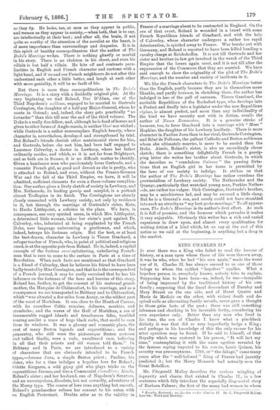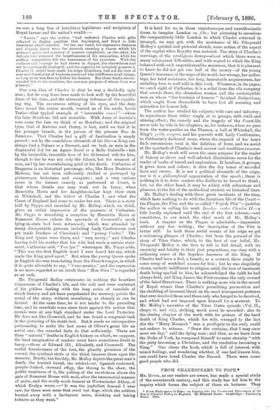KING CHARLES IL* IF ever there was a King who
failed to read the lessons of history, or a man upon whom those of life were thrown away, it was he who, when he had "his own again," made the worst use of it. Charles IL has always seemed to us one of those beings to whom the epithet " hopeless " applies. What a hopeless person is, everybody knows, nobody tries to explain.
Supposing him to have been—as, indeed, he was—incapable of being impressed by the traditional history of his own family ; supposing that the lineal descendant of Darnley and Mary Stuart on the one side, and of Henri Quatro and Marie de Medicis on the other, with violent death and de- spised exile as alternating family records, never gave a thought to those grim facts of the past ; there was still something inhuman and shocking in his incurable levity, considering his own experience only. Better than any man who lived in his time, the son of Charles I. knew what a pinchbeck divinity it was that did so very imperfectly hedge a King ; and perhaps in his knowledge of this the only excuse for his utter cynicism may be found. If he said to himself, of that Royalty which was restored in his person, "It will last my time," contemplating it with the same egotism revealed by the famous saying imputed to his cousin, Louis Quinze, his security was presumptuous. 1789, or "the deluge," came many years after the well-beloved " King of France had jauntily predicted it; but the Merry Monarch had actually seen the Great Rebellion.
Mr. Fitzgerald Molloy describes the carious mingling of depravity and charm that existed in Charles IL, in a few sentences which fitly introduce the especially disgraceful story of Barbara Palmer ; the first of the many bad women to whom
• Royalty Restored; or, London under Charles II. By J. Fitzgerald Molloy. Lonlon : Ward and Downey.
we owe a long line of hereditary legislators and recipients of Royal favour and the nation's wealth :—
"Nature," says the author, "had endowed Charles with gifts adapted to display qualities that fascinated, and fitted to hide blemishes which repelled. On the one hand, his expressive features and shapely figure went far towards creating a charm which his personnl grace and courtesy of manner completed ; on the other, his delicate tact screened the heartlessness of his sensualism, while his surface sympathies hid the barrenness of his cynicism. With the coolness and courage he had shown in danger, the shrewdness and wit he continually displayed, and the capacity he certainly possessed, Charles II. might have made his reign illustrious, had not his love of ease and detestation of business rendered him indifferent to all things, so Img as be was free to follow his desires. But these faults recom- mended him to his courtiers, the common purpose of whose lives was
p'easure."
Our own idea of Charles is that he was a decidedly ugly man ; but he may have been made to look well by the beautiful dress of his time, and the extenuating influence of the equalis- ing wig. The cavernous setting of his eyes, and the deep lines round the coarse mouth, remind us of his uncle, Louis Treize—that typical example of "inexorable ennui"—whom the later Bourbons did not resemble. With Anne of Austria's sons came the face we think of as Bourbon ; and the original type, that of Antoine and Henry, is lost, until we find it in the younger branch, in the person of the present Due de Nemours. That Charles had a gift of fascination is amply proved ; not by the scandalous chronicle of his life—a King can always find a Palmer or a Stewart, and we look in vain in the disgraceful list for an Agnes Sorel or a Belle Gabrielle—but by the invincible, incurable love of his ill-treated wife for him, though to her he was not only the falsest, but the meanest of men, and by her overwhelming grief at his death. Catharine of Braganza is an historical personage, who, like Mary Beatrice of Modena, has not been sufficiently studied or portrayed by picturesque historians and essayists ; and a very curious scene in the human comedy as performed at Court, is that whose details one may work out in fancy, when Henrietta Maria and her daughter-in-law kept their state at Whitehall, and the widow of Charles I. saw what the Court of England had come to under her son. There is a story told by Pepys, and recorded by Mr. Molloy, which, we think, gives an unfair impression of the manners of Catharine. Mr. Pepys is describing a reception by Henrietta Maria at Somerset House (where the spectacle of Cromwell's mock lying-in-state had been witnessed), which was attended by many disreputable persons, including Lady Cutlemaine (not yet made Duchess of Cleveland) and "young Crofts." The King and Queen were there, and "very merry ;" and Charles having told his mother that his wife had made a certain state- ment, Catharine said, "You lye !" whereupon Mr. Pepys adds, "This was the first English word I ever heard her say, which made the King good sport." But when the young Queen spoke in English she was translating from the French tongue, in which it is quite allowable to say, " Vous mentez," and the expression is no more regarded as an insult than "Mon Dieu !" is regarded as an oath.
Mr. Fitzgerald Molloy extenuates in nothing the heartless viciousness of Charles's life, and the cold and even contempt of his pitiless dealing with the long series of scandals of which history and art have perpetuated the memory, points the moral of the story, without moralising, as sharply as can be desired. At the same time,-he is not tender to the preceding time, ani he marshals some stern facts against the notion that morals were at any high standard under the Lord Protector. He does not like Cromwell, and he has found a congenial task in the picturing of his death-bed. But it needs no retrospective partisanship to make the last scene of Oliver's great life an awful one ; the recorded facts do that sufficiently. There are three "natural "deaths in English history on which, we suppose, the least imaginative of readers must have sometimes dwelt in fancy,—those of Edward III., Elizabeth, and Cromwell. The sordid forsakenness of the first, the ghastly grimness of the second, the spiritual strife of the third, impress them upon the memory. Briefly, but forcibly, Mr. Molloy depicts the great man's death, the hurried burial, the tricked-out, Spanish-costumed, purple-cloaked, crowned effigy, the throng to the show, the public weariness of it., the pelting of the escutcheon above the gate of Somerset House with mud, after the immemorial manner of mobs, and the costly mock-funeral at Westminster Abbey, of which Evelyn wrote :—" It was the joyfallest funeral I ever saw, for there were none that cried but dogs, which the soldiers hunted away with a barbarous noise, drinking and taking tobacco as they went." It is hard for us, in these unpicturesque and unenthusiastic times, to imagine London en fête ; but picturing to ourselves the comparatively little London to which Charles returned in triumph, we may get, with the assistance of Mr. Fitzgerald Molloy's spirited and pictorial sketch, some notion of the aspect of the capital when Royalty was restored. The story of Charles's marriage, of the prodigious dowry—about which there were so many subsequent difficulties, and with regard to which the King behaved with such ungentlemanlike meanness, that it is pleasant to know he did not get one half of the money—of the young Queen's innocence of the ways of his world, her wrongs, her suffer- ings, her brief resistance, her long, lamentable acquiescence, her unfailing love, is well told in this book. Whenever, in its pages, we catch sight of Catharine, it is a relief from the vile company that crowds them, the shameless women and the contemptible men on whom "the fountain of honour" lavished distinctions, which ought from thenceforth to have lost all meaning and attraction for honest folk.
The author has studied his subjects with care and industry ; he reproduces them either singly or in groups, with vivid and stirring effect ; the comedy and the tragedy of the Court-life move side by side in his chapters, as, for instance, when we pass from the water-parties on the Thames, a ball at Whitehall, the King's petits soupers, and his quarrels with Lady Castlemaine, to Catharine's darkened room, where the anguish of her heart finds unconscious vent in the delirium of fever, and we assist at the spectacle of Charles's weak sorrow and worthless remorse.
Mr. Molloy's work will serve the same purpose for the reader of history as clever and well-selected illustrations serve for the reader of hooks of travel and exploration. It localises, it groups, it gives form and colour; it stirs the dry bones of recorded facts and events. It is not a political chronicle of the reign, nor is it a philosophical appreciation of the epoch ; there is nothing in it to deter readers who dislike to be forced to think ; but, on the other hand, it may be added, with advantage and pleasure, to the list of the methodical student on historical lines.
Mr. Molloy's dealing with three great incidents of the time, which have nothing to do with the licentious life of the Court— the Plague, the Fire, and the so-called "Popish Plot "—justifies the author in calling his work London under Charles 11—a title hardly explained until the end of the first volume,—and constitutes, to our mind, the chief merit of Mr. Molloy's book. A chapter on the Plague is admirable,—impressive without any fine writing ; the description of the Fire is better still. In both these awful events of his reign we get a redeeming glimpse of Charles ; but from the perusal of the story of Titus Oates, which, to the best of our belief, Mr. Fitzgerald Molloy is the first to tell in full detail, with its enormity and fatuity in their just proportions, one rises with a sickening sense of the hopeless baseness of the King. If Charles had been a fool, a fanatic, or a coward, there might be some scrap of wretched excuse for him ; but he was singularly clever, entirely indifferent to religion until, the test of imminent death being applied to him, he acknowledged the faith he had always held, and King James the First remains the only coward of the fated Stuart race. There is nothing more vile in the record of Royal crimes than Charles's permitting persecution and the shedding of innocent blood, on the most transparent pretence that ever deceived those and those only who longed to be deceived, and which had not imposed upon himself for a moment. To Mr. Molloy's narrative of the Titus Oates episode (Vol. II., chaps. vi. and vii.), striking merit must be accorded ; also to the closing chapter of the work, with its picture of the hard death of King Charles, which his wife, wronged to the last (for the "Merry Monarch" was a profligate to the end), could not endure to witness. "Draw the curtains, that I may once more see day," said the dying man; and then, as we learn from the Duke of York, he composed himself to enter eternity "with the piety becoming a Christian, and the resolution becoming a. King." One closes the book, which is full of interest, with mixed feelings, and wondering whether, if one had known him, one could have loved Charles the Second. There were some good people who did.















































 Previous page
Previous page